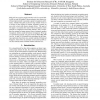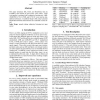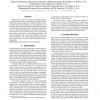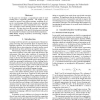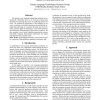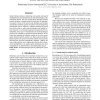INTERSPEECH
2010
12 years 11 months ago
2010
Unlike most of the world's languages, Korean distinguishes three types of voiceless stops, namely lenis, fortis, and aspirated stops. All occur at three places of articulatio...
INTERSPEECH
2010
12 years 11 months ago
2010
In this paper we investigate the prosody and voice quality of dominance in scenario meetings. We have found that in these scenarios the most dominant person tends to speak with a ...
INTERSPEECH
2010
12 years 11 months ago
2010
Being able to recognize people from their voice is a natural ability that we take for granted. Recent advances have shown significant improvement in automatic speaker recognition ...
INTERSPEECH
2010
12 years 11 months ago
2010
This paper introduces Silk, CELT, and BroadVoice that are available in the internet as open source voice codecs. Their voice quality is evaluated with a subjective listening test....
INTERSPEECH
2010
12 years 11 months ago
2010
Inspired by the recent improvements in domain adaptation and session variability compensation techniques used for speech and speaker processing, we study their effect for emotion ...
INTERSPEECH
2010
12 years 11 months ago
2010
In this paper we investigate a computational model of word learning that is cognitively plausible. The model is partly trained on incorrect form-referent pairings, modelling the i...
INTERSPEECH
2010
12 years 11 months ago
2010
Intonational research is often dependent upon hand-labeling by trained listeners, which can be prone to bias or error. We apply tools from Functional Data Analysis (FDA) to a set ...
INTERSPEECH
2010
12 years 11 months ago
2010
We describe a new language-independent technique for automatically identifying errors in an electronic pronunciation dictionary by analyzing the source of conflicting patterns dir...
INTERSPEECH
2010
12 years 11 months ago
2010
According to articulatory phonology, the gestural score is an invariant speech representation. Though the timing schemes, i.e., the onsets and offsets, of the gestural activations...
INTERSPEECH
2010
12 years 11 months ago
2010
Speech therapy aiming at improving voice quality and speech intelligibility is often hampered by the lack of knowledge of the underlying deficits. One way to help speech therapist...

